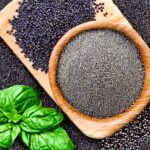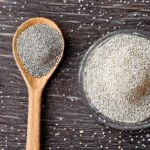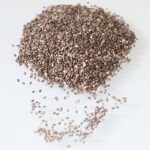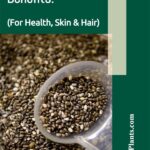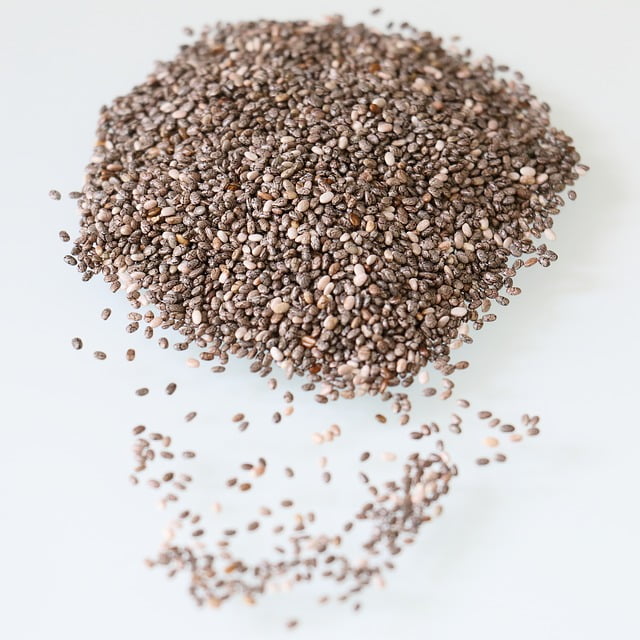
Chia seeds are small black and white seeds that are a great addition to any plant-based diet! They are highly nutritious and provide tons of health benefits.
In this post, we will look at what chia seeds are, including where they come from, their benefits, how to use them, and more.

- What are Chia Seeds?
- Where Do Chia Seeds Come From?
- Chia Seeds History
- Chia Seeds Benefits
- How to Use Chia Seeds
- Side Effects of Chia Seeds
What are Chia Seeds?
Chia seeds are small super nutritious seeds that are often consumed by grinding them into a powder and adding them to foods or drinks. They can also be consumed whole and are often added to baked goods or used as a topping for salads and other dishes. In addition to their nutritional benefits, chia seeds are also known for their ability to absorb water and form a gel-like substance, which makes them useful as a natural thickener in recipes.
Where Do Chia Seeds Come From?
Chia seeds are native to Central and South America, where they have been cultivated and used as a food source for centuries. The seeds come from the chia plant (Salvia hispanica), which is a member of the mint family. The plant is native to Mexico and Guatemala, but it is now grown in many other countries around the world, including the United States, Canada, and Australia.
Chia Seeds History
The history of chia seeds can be traced back to the ancient Aztec civilization, where they were considered a staple food and were used as a form of currency. Chia seeds were a particularly important food source for the Aztecs due to their ability to provide sustained energy and nutrition. They were also believed to have medicinal properties and were used to treat a variety of ailments.
After the fall of the Aztec Empire, chia seeds fell out of favor and were largely forgotten until they were rediscovered in the 20th century. In recent years, chia seeds have gained popularity as a “superfood” due to their numerous health benefits. They are thought to help improve digestion, regulate blood sugar levels, and reduce the risk of heart disease. They are also a good source of antioxidants, which can help protect the body against the damaging effects of free radicals.
Chia Seeds Benefits
One of the key nutritional benefits of chia seeds is their high fiber content. Chia seeds are an excellent source of both soluble and insoluble fiber, which can help promote regular bowel movements and improve digestive health. Soluble fiber can also help to lower cholesterol levels and regulate blood sugar levels, making it beneficial for people with diabetes or at risk of heart disease.
In addition to their high fiber content, chia seeds are also a good source of protein. They contain all nine essential amino acids, making them a complete protein source. This makes them a particularly good choice for vegetarians and vegans who may be seeking plant-based protein sources.
Another key nutrient found in chia seeds is omega-3 fatty acids. Omega-3s are important for maintaining heart health and are believed to have anti-inflammatory properties. Chia seeds are an excellent plant-based source of omega-3s, making them a good choice for those who do not consume fish or other animal-based sources of omega-3s.
Chia seeds are also a good source of important minerals such as calcium, potassium, and iron. Calcium is essential for maintaining healthy bones and teeth, while potassium is important for regulating heart function and blood pressure. Iron is necessary for the production of red blood cells and the transportation of oxygen throughout the body.
The good thing is chia seeds are also easy to use, and you can start with as little as 1 tsp of chia seeds everyday in order to start increasing your health!
(Learn more at Chia Seeds Benefits and Side Effects)
How to Use Chia Seeds
There are many ways to incorporate chia seeds into your diet. They can be easily added to a variety of foods and drinks, such as smoothies, yogurt, oatmeal, and baked goods.
They can also be used as a topping for salads and other dishes, or mixed into dips and spreads. Chia seeds can be consumed whole or ground into a powder. Another method is to put chia seeds in water to create a gel-like consistency. This is known as soaking chia seeds.
If you are looking for recipes, see Chia Seeds Recipes.
Side Effects of Chia Seeds
Chia seeds are generally considered safe to consume and are well-tolerated by most people. However, like any food or supplement, they may cause side effects in some individuals. Some potential side effects of consuming chia seeds include:
- Digestive issues: Chia seeds are high in fiber, which can cause digestive issues such as bloating, gas, and diarrhea in some people. It is important to start with a small amount of chia seeds and gradually increase your intake to allow your body to adjust to the fiber content.
- Allergic reactions: Some people may be allergic to chia seeds and may experience allergic reactions such as hives, rash, or difficulty breathing after consuming them. If you experience any allergic reactions after consuming chia seeds, it is important to stop using them and seek medical attention.
- Interference with medication: Chia seeds may interfere with the absorption and effectiveness of certain medications. If you are taking any medications, it is important to speak with a healthcare professional before adding chia seeds to your diet to ensure they are safe to consume.
- Nutrient interactions: Chia seeds are high in fiber, which can interfere with the absorption of certain nutrients, such as iron and zinc. It is important to consume a varied and balanced diet to ensure that you are getting all of the nutrients you need.
Overall, chia seeds are a nutritious and safe food that can be easily incorporated into a healthy diet. However, it is important to consume them in moderation.
They should also be stored properly to prevent them from going rancid. Chia seeds can be stored in an airtight container in a cool, dry place for longevity.
Lance has been passionate about the plant-based diet and we have been following a whole food plant-based diet for over 5 years. We focus on health, natural healing, weight management, animal rights, and the health of the planet and environment by focusing on whole plant-based foods and sustainable practices.
Learn more at the About Me page and follow on social media at the links below.

